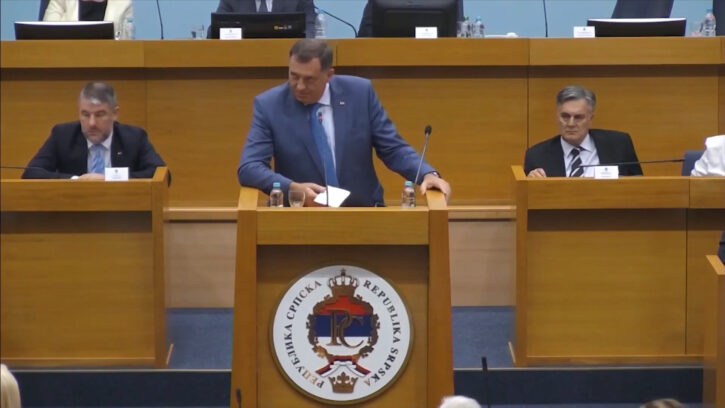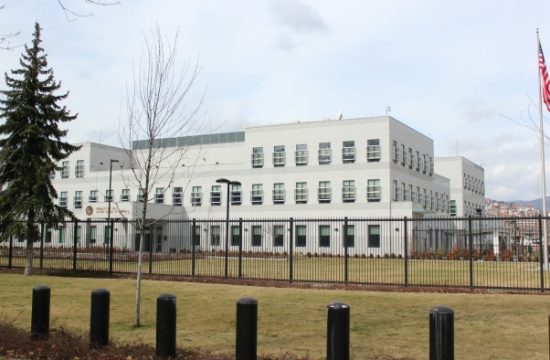
Bosnia’s Serb-majority region, Republika Srpska (RS), does not have a right to “give up on its autonomy and statehood”, Bosnian Serb leader Milorad Dodik said as he addressed RS lawmakers on Monday in an effort to gain their support for reversing numerous reforms that were made in the country since the war and abolishing a set of powers of Bosnia’s international administrator.
Dodik, who is the Serb member of the tripartite Presidency and the leader of the ruling party in the RS, told the lawmakers in the RS National Assembly that all conditions foreseen by international law have been met for the Serb semi-autonomous entity to secede from Bosnia.
Citing the International Covenant on Civil and Political Rights and the International Covenant on Economic, Social and Cultural Rights, Dodik, who has been advocating for years for the secession of the entity which was created during the 1992-95 war, said the right of the Bosnian Serbs to form their own country is based on the fact that they are discriminated against in Bosnia.
He said that according to interpretations of acts of international law, secession as the ultimate form of creation of one's own state can only be used by “peoples who are suffering discrimination, lack the right to a representative government, and only if discriminatory behaviour is so deep, branched out and systematic that it specifically threatens the survival of those peoples and if there is no strong likelihood that discrimination will end.”
All of those conditions have been met, he said.
“Republika Srpska, which has, as a state of the Serb people and others who live there brought its statehood, territory, government and population into the Dayton Agreements, constantly suffers from unjust activities by the OHR (Office of the High Representative) and the Constitutional Court. Its rights which are guaranteed according to Bosnia’s Constitution are constantly being breached – competencies are being stripped away and institutions at the state level have been formed without a clear constitutional basis for it,” he said.
The OHR is the institution of the international official named to oversee the civilian implementation of the Dayton Agreement, which includes Bosnia’s Constitution. The current High Representative is Austrian diplomat Valentin Inzko.
The official has a special set of powers – the ‘Bonn Powers’ – which allow him to, among other things, fire officials and impose laws.
Dodik has been arguing that too many authorities the Dayton Peace Agreement had given Republika Srpska were transferred to the central government.
This, he argued, is a violation of Bosnia’s Constitution, although Bosnian Serb lawmakers in the country’s parliament have also voted for them.
Dodik said that the reforms implemented after the war were carried out under pressure from international representatives who “manipulated with a fake compromise” while working in the interests of Bosniaks who prefer a centralized state.
“Now we know that these were lies damaging Serbs in the RS (…) That is why it’s time to draw the line, to see where we are now 25 years after the Dayton Agreement was signed,” Dodik said, arguing that the judicial, defence and tax reforms have harmed Republika Srpska.
Bosnia’s two entities – the Federation (FBiH), which occupies 51 percent of the country and is mostly populated by Bosniaks and Croats and Republika Srpska (RS) which has 49 percent of the territory – had their own separate armies, tax and judicial systems. Over the years those melted into joint, state-level systems.
“All of this has stripped off competencies from the RS,” Dodik said, adding that “Bosniaks are not complaining about those reforms because they favour a centralised Bosnia and Herzegovina, which they couldn’t achieve during the war and in the Dayton Peace Agreement.”







